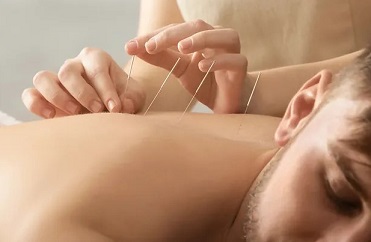Taiwanese Study Shows That Acupuncture Can Reduce Risk Of Stroke That Is Typically Associated With Rheumatoid Arthritis
Kittisak Meepoon Fact checked by:Thailand Medical News Team Mar 17, 2024 1 year, 1 month, 1 week, 3 days, 1 hour, 47 minutes ago
Alternative Medicine: Rheumatoid arthritis (RA) is a chronic autoimmune disease characterized by joint inflammation, leading to pain, stiffness, and potentially joint damage. Beyond its impact on the musculoskeletal system, RA is associated with an increased risk of cardiovascular complications, including ischemic stroke. Ischemic stroke, caused by a blockage in a blood vessel supplying the brain, is a significant concern due to its potential for long-term disability and mortality. In recent years, researchers have delved into alternative therapies, such as acupuncture, to address both the symptoms of RA and its associated cardiovascular risks. This
Alternative Medicine news report covers a recent study by Taiwanese researchers from Taichung Tzu Chi Hospital, China Medical University, Dalin Tzu Chi Hospital and Tzu Chi University of Science and Technology that show the benefits of acupuncture in reducing the risk of stroke in individuals with rheumatoid arthritis.
 Acupuncture Can Reduce Risk Of Stroke That Is Typically
Acupuncture Can Reduce Risk Of Stroke That Is Typically
Associated With Rheumatoid Arthritis
Understanding the RA-Stroke Connection
RA patients face a higher risk of stroke compared to the general population. The chronic inflammation seen in RA not only affects joints but also contributes to systemic inflammation, which plays a role in the development of cardiovascular diseases, including stroke. Managing inflammation effectively is key to reducing the risk of stroke in RA patients.
The Role of Acupuncture in RA Management
Acupuncture, a traditional Chinese medicine practice involving the insertion of thin needles into specific points on the body, has gained recognition for its therapeutic benefits in managing pain and inflammation. Studies have shown that acupuncture can modulate the immune response, reduce inflammation, and alleviate pain, making it a potentially valuable adjunct therapy for RA.
The Taiwanese Study: Methodology and Key Findings
The Taiwanese study published in BMJ Open sought to investigate the impact of acupuncture on stroke risk in RA patients. The researchers utilized national medical records from the Registry for Catastrophic Illness Patients Database (RCIPD) and identified 47,809 adults newly diagnosed with RA between 1997 and 2010. Of these, 12,266 received acupuncture treatment following their diagnosis.
The study design involved matching patients who received acupuncture with a control group based on age, sex, comorbidities, medication use, and year of diagnosis. The analysis revealed a significant reduction in the risk of ischemic stroke among RA patients who underwent acupuncture compared to those who did not. This risk reduction remained consistent across different patient demographics and medical histories.
Mechanisms Behind Acupuncture's Benefits
Acupuncture's potential to reduce stroke risk in RA patients can be attributed to several mechanisms:
-Anti-
Inflammatory Effects: Acupuncture has been shown to modulate pro-inflammatory cytokines, which are elevated in RA patients and contribute to cardiovascular complications. By reducing systemic inflammation, acupuncture may mitigate the risk of stroke.
-Pain Management: RA patients often experience pain, which can limit physical activity and contribute to cardiovascular risk factors. Acupuncture's analgesic effects can improve mobility, encourage exercise, and indirectly lower stroke risk.
-Blood Pressure and Lipid Control: Acupuncture has demonstrated the ability to regulate blood pressure and lipid profiles, two crucial factors in stroke prevention. By maintaining cardiovascular health, acupuncture contributes to overall stroke risk reduction.
-Improving Quality of Life: Beyond its physiological effects, acupuncture can enhance mental well-being, reduce stress, and improve sleep quality. These factors indirectly influence stroke risk by promoting overall health and resilience.
Limitations and Future Directions
While the Taiwanese study provides valuable insights, there are limitations to consider. The observational nature of the study limits causal inference, highlighting the need for randomized controlled trials to establish causality definitively. Additionally, factors such as specific acupuncture protocols, treatment duration, and individual patient responses warrant further investigation.
Future research should focus on standardizing acupuncture protocols, exploring optimal treatment frequency and duration, and assessing long-term outcomes, including stroke recurrence rates. Collaborative efforts between traditional medicine practitioners, rheumatologists, and cardiovascular specialists can facilitate comprehensive care for RA patients at risk of stroke.
Clinical Implications and Patient Education
For healthcare providers, the findings from the Taiwanese study underscore the potential role of acupuncture as part of a holistic treatment approach for RA patients. Integrating acupuncture into multidisciplinary care plans can enhance pain management, reduce inflammation, and mitigate cardiovascular risks, including stroke. Patient education regarding the benefits of acupuncture, its safety profile, and potential synergies with conventional treatments is essential for promoting informed decision-making and treatment adherence.
Conclusion
In conclusion, acupuncture emerges as a promising intervention in reducing stroke risk among rheumatoid arthritis patients. The Taiwanese study's robust findings highlight acupuncture's multifaceted benefits, from anti-inflammatory effects to pain management and cardiovascular risk reduction. Moving forward, collaborative research endeavors and evidence-based practice guidelines will further elucidate acupuncture's role, paving the way for enhanced care and improved outcomes for individuals navigating the complexities of RA and its associated cardiovascular risks.
The study findings were published in the peer reviewed journal: BMJ Open.
https://bmjopen.bmj.com/content/14/2/e075218
For the latest on
Alternative Medicine, keep on logging to Thailand Medical News.
Read Also:
https://www.thailandmedical.news/news/study-shows-that-acupuncture-and-acupressure-can-help-cancer-patients-deal-with-pain
https://www.thailandmedical.news/news/acupuncture-alleviates-xerostomia-conditions-in-cancer-patients--
https://www.thailandmedical.news/news/help-for-stress-incontinence
